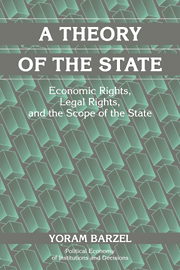Book contents
- Frontmatter
- Contents
- Preface
- 1 Introduction
- I The Emergence of Protection and Third-Party Enforcement
- 2 The State and the Enforcement of Agreements
- 3 Third-Party Enforcement and the State
- 4 The Choice among Enforcement Forms
- 5 Anonymous Exchange, Mixed Enforcement, and Vertical Integration
- 6 Jurisdictional Issues
- 7 Collective Action and Collective Decisions
- 8 Tying the Protector's Hands: The Agreement between Subjects and Protector
- II The Emergence of Legal Institutions
- III The Character of the State
- References
- Index
- Other Books in the Series
7 - Collective Action and Collective Decisions
Published online by Cambridge University Press: 04 December 2009
- Frontmatter
- Contents
- Preface
- 1 Introduction
- I The Emergence of Protection and Third-Party Enforcement
- 2 The State and the Enforcement of Agreements
- 3 Third-Party Enforcement and the State
- 4 The Choice among Enforcement Forms
- 5 Anonymous Exchange, Mixed Enforcement, and Vertical Integration
- 6 Jurisdictional Issues
- 7 Collective Action and Collective Decisions
- 8 Tying the Protector's Hands: The Agreement between Subjects and Protector
- II The Emergence of Legal Institutions
- III The Character of the State
- References
- Index
- Other Books in the Series
Summary
This chapter commences by arguing that individuals must form collective-action mechanisms to protect themselves from their own protectors. We next consider the erection of a collective-action mechanism and the ability of that mechanism to punish defectors. The discussion then turns to the peculiar nature of the balance between the power of this mechanism and that of the protector and the measures needed to prevent the protector from taking over. We continue with a discussion of the decision-making mechanism, vote allocation, and the need for a voting supermajority. The prevention of capture and the notion of rentseeking follow. Then comes a discussion of controlling the protectors without collective action, followed by considerations of expanding the state and the accompanying collective-action mechanism. We close with conclusions.
THE NEED FOR COLLECTIVE ACTION IN CONSTRAINING PROTECTION SPECIALISTS
Rule-of-law regimes, that is, regimes where clients control the protection organizations, are characterized by the relative ease with which they can be turned into dictatorships and by the difficulty of restoring the rule of law once it has been lost. Both difficulties stem from the problems of collective action. Unless individuals cooperate to prevent dictatorship from emerging and to overturn it once it seizes power, the strongest individual among any unorganized group can subdue the rest, one at a time, and thus become and remain a dictator. Not only can a dictator be expected to enrich himself at his subjects' expense, but also he can be expected to adopt oppressive measures to lower the opportunity for revolt.
- Type
- Chapter
- Information
- A Theory of the StateEconomic Rights, Legal Rights, and the Scope of the State, pp. 113 - 137Publisher: Cambridge University PressPrint publication year: 2001



